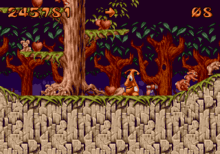Puggsy
| Puggsy | |
|---|---|
 | |
| Developer(s) | Traveller's Tales |
| Publisher(s) | Psygnosis |
| Designer(s) | Jon Burton (Planning, programming, level design), Andy Ingram (Planning, artwork) |
| Composer(s) | Matt Furniss |
| Platform(s) | Mega Drive Mega-CD Amiga |
| Release date(s) | 1993 / 1994 (MD version) |
| Genre(s) | Platform |
| Mode(s) | Single player |
| Distribution | 8-megabit cartridge floppy disk |
Puggsy is a 1993 platform/puzzle game, designed by Traveller's Tales and released by Psygnosis on the Sega Mega Drive/Genesis and Sega Mega CD/Sega CD consoles, and the Amiga computer. Puggsy is the name of the title character, an orange space hopper-like alien who landed his spaceship on The Planet, intending to return home until his spaceship was stolen by the raccoon natives of the planet.
History
The Puggsy character originally appeared in an Amiga demo named "Puggs in Space", which was created and designed by demo group DIONYSUS (Lee Carus, Alan McCarthy and Tim Wright). DIONYSUS originally developed the game for the Commodore Amiga, but after a short period of time, the rights were bought out by Psygnosis and Traveller's Tales was tasked with developing the project.
The promised sequel upon completion of the game was canceled. Additionally, a Super NES version was almost completed, but canceled.
Gameplay
The gameplay is mostly a cross between a normal platform game, with the usual style of platformer enemies and a variety of means to kill them, and a puzzle game of sorts where Puggsy is often required to find objects, and either carry them to a specific location or somehow use them in order to complete levels. There are also a variety of objects that have power-up effects, such as allowing Puggsy to be hit once or twice without dying, speeding him up or making him temporarily invincible, and objects that while not necessary, can be temporarily helpful, such as a variety of guns (most of which have limited ammunition which can often not be refilled).
Objects react on a clever physics based system, which was an innovative feature at the time and was a rarely used feature in games until two console generations later with the release of games such as Second Sight, Max Payne 2 and Half-Life 2.The system allows objects to be thrown, or to topple if stacked without care. Each object also has a different weight. Another effect of this is that Puggsy can carry stacks of objects along a flat surface, but a slope will often cause all items except the bottom one (held by Puggsy) to topple and scatter. Also, any objects carried out of the level exits give different score values, or in the case of the heart object, an extra life. Other objects are extremely varied, including shells, weights, matches, keys, balloons, cups, barrels, clue-giving chests, knives, and candles.

The game features 57 levels in a variety of settings (16 of those levels being secret) and 6 boss characters (9 boss characters in the Mega-CD version), although not all levels and bosses have to be finished to complete the game, and 5 training levels, accessed from the "Junior" option on the title screen. Also, while you can just play through the game normally and reach the normal ending, a few secret "endings" (cinematic sequences that can only be terminated by resetting the console, or that reset the game themselves) are available by achieving certain goals, such as leaving one secret level with blocks that spelt out the word "HEROS", playing all 51 normal levels (6 of the secret levels are only accessible via a special password, and are not counted towards the normal level total), or playing through the 6 previously mentioned special secret levels. The password to obtain these levels had to be obtained by evaluation three math expressions that appeared during the credits, where they are called "a silly maths equation". In the "HEROS" ending, the player is congratulated for finding the ending, and then asked, "...but are you good at maths?". The Sega Genesis and Mega-CD soundtrack was scored by Matt Furniss.
MegaTech gave the game 90% and a Hyper Game Award, saying that it was "excellently designed and thought-out", but listed the control system as the major weak point.[1]
Anti-piracy measures
Puggsy does not use SRAM, as it employs a conventional password system to save progress. However, from the 5th stage onward (the first Red Woods level), and on three other events throughout the game, an attempt is made to write to procedurally-selected SRAM address; if successful, the game displays a message stating that the user should buy a cartridge version of Puggsy and quit playing the "silly copy". The game then returns to the world map. Emulators with an option to disable SRAM can effectively bypass this countermeasure.
The Sega CD and Amiga ports do not have this anti-piracy feature.
Reception
Reviewing the Sega CD version, GamePro praised the controls, the graphics, the sound effects, the strong challenge, and the attention to detail, concluding that "Though veteran gamers will quickly tire of Puggsy, younger players will enjoy his island antics."[2]